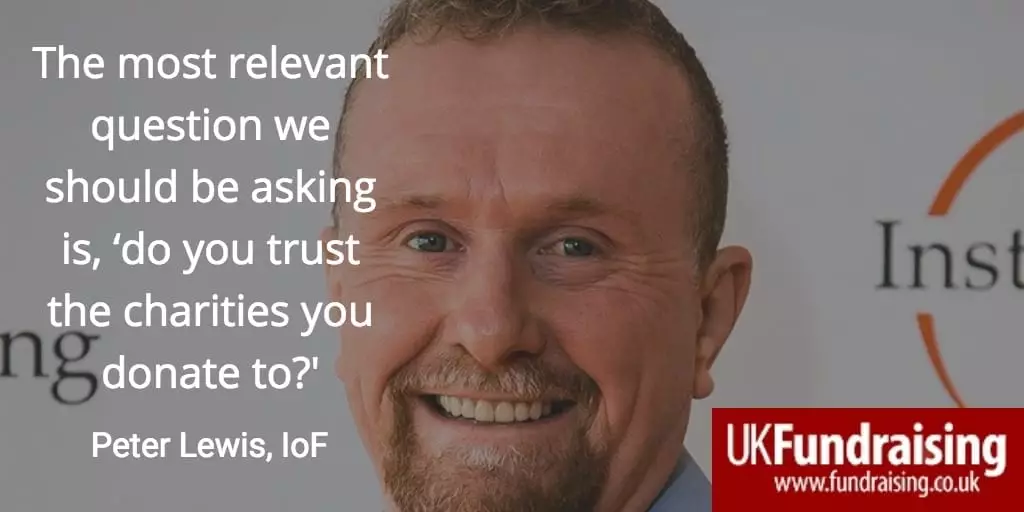Charities need to focus on being trustworthy, not on trust – fundraising can lead the way
As charity fundraisers we are acutely aware of the recent figures on trust in charities. Charity Commission data on trust shows it has fallen to the lowest recorded level since monitoring began in 2005, with fundraising practice seen as one of the issues behind this decline. There have been near unanimous call for action to address this, but less discussion about what it really means when we hear that ‘trust’ has fallen in our organisations, and what we should or can actually do about it.
I believe the charity sector needs to focus not on generic levels of trust, but on our organisations acting in a trustworthy way and showing evidence that we are trustworthy. I would urge everyone thinking about the future of the charity sector to listen to this erudite exposition on trust and trustworthiness by Baroness Onora O’Neil, Professor of Philosophy at Cambridge University and cross bench member of the House of Lords.
Baroness O’Neil’s basic proposition is that focussing on polling or survey data of generic levels of trust is wrongheaded, and that aiming to raise broad levels of trust is not in itself a good objective. What we should be aiming for is higher levels of trust in people or institutions that are trustworthy, and less trust in ones that are not trustworthy: We should trust charities who do what they say, but not ones who don’t.
Advertisement
Her first key point is that we make judgements about individual organisations and people according to the specific situation in which we find ourselves. For example, we might trust a specific teacher to teach a child to read, but, having seen them drive a car before, we might not trust them to drive the school mini bus.
The second of Baroness O’Neil’s key points is that trust is given by other people. You can’t control how other people feel; you can only contribute to how they feel. And you do this by both being trustworthy and exhibiting trustworthiness. Only when you show evidence that you are trustworthy should people trust you.
So how do we apply this to addressing levels of trust in charities, and particularly for our work as fundraisers?
Being trustworthy
The way we fundraise needs to have a clear focus on both being trustworthy, and providing evidence to the general public and supporters that it is done in a trustworthy way. As every good fundraiser knows, the closer your relationship with your supporters, the easier it is to give evidence to them that you are trustworthy. When someone has given money towards the cause you take forward, you demonstrate what you have achieved with their contribution, showing that you are trustworthy.
For fundraisers, it is important and encouraging to note that over the last year, data from both Managing in the New Normal and Rapidata, current donors are continuing to give to the causes they support. More people than ever are demonstrating their trust in the charities they currently support by continuing to do so, despite some of the negative headlines.
Why is this the case? Of course, it is testament to the continued generosity of the British public.
But it is also important to think about the changes that we as a fundraising community have been taking. Many fundraisers over the last year have been asking their supporters how they want to be contacted; asking whether they want to opt-out of communication with them; asking what their donors or supporters prefer, and then following through on delivering these. Charities have been making themselves more responsive their donors’ wishes and preferences. In doing so charities are demonstrating trustworthiness. Communication, transparency and action in our relationships with donors and supporters is key.
For me, Baroness O’Neil’s analysis is a positive one for charities and fundraisers in the UK. I fundamentally believe the vast majority of charities are trustworthy. And in particular many charities have demonstrated that trustworthiness in their fundraising activity over the last year by listening to feedback from the public and from their donors, and improving their practices as a result.
Perhaps the final stage is for those charities to show donors and the public even more clearly evidence of these changes and improved practices, as well as talking about the positive change it is making in the world.

My concern now is that all of this may well not be enough to raise generic survey data of levels of trust in the short term, as these include the opinions of those further away from charities, less likely to have seen both the impact and the changes that charities are making.
The most relevant question we should be asking is, ‘do you trust the charities you donate to?’ where the answer is more likely to be informed and differentiated, showing people making judgements based on their actual experiences.
As we respond to the concerns about falling aggregate levels of trust, I believe that the fundraising community is now taking the lead in helping to rebuild this. Charity fundraisers need to continue efforts to ensure our work is both trustworthy and is seen to be trustworthy, is open and responsive to supporters, and gives honest evidence of our work and efforts to our donors, campaigners, volunteers, beneficiaries, and the wider public.




